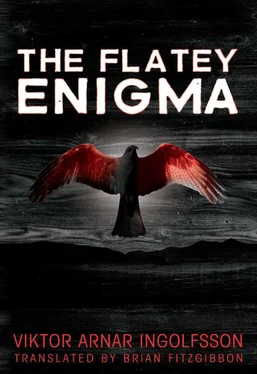Viktor Ingolfsson - The Flatey Enigma
Здесь есть возможность читать онлайн «Viktor Ingolfsson - The Flatey Enigma» весь текст электронной книги совершенно бесплатно (целиком полную версию без сокращений). В некоторых случаях можно слушать аудио, скачать через торрент в формате fb2 и присутствует краткое содержание. Жанр: Триллер, на английском языке. Описание произведения, (предисловие) а так же отзывы посетителей доступны на портале библиотеки ЛибКат.
- Название:The Flatey Enigma
- Автор:
- Жанр:
- Год:неизвестен
- ISBN:нет данных
- Рейтинг книги:5 / 5. Голосов: 1
-
Избранное:Добавить в избранное
- Отзывы:
-
Ваша оценка:
- 100
- 1
- 2
- 3
- 4
- 5
The Flatey Enigma: краткое содержание, описание и аннотация
Предлагаем к чтению аннотацию, описание, краткое содержание или предисловие (зависит от того, что написал сам автор книги «The Flatey Enigma»). Если вы не нашли необходимую информацию о книге — напишите в комментариях, мы постараемся отыскать её.
The Flatey Enigma — читать онлайн бесплатно полную книгу (весь текст) целиком
Ниже представлен текст книги, разбитый по страницам. Система сохранения места последней прочитанной страницы, позволяет с удобством читать онлайн бесплатно книгу «The Flatey Enigma», без необходимости каждый раз заново искать на чём Вы остановились. Поставьте закладку, и сможете в любой момент перейти на страницу, на которой закончили чтение.
Интервал:
Закладка:
Kjartan said good-bye and walked away toward Svalbardi while Benny was searching for his cigarette stub in the rhubarb patch that grew along the walls of the house.
As luck would have it, Kjartan bumped into the farmers Sigurbjorn and Gudjon together. Sigurbjorn was sitting on a stool in front of the entrance to the Svalbardi farmhouse with an old sheet over his shoulders that was tied around his neck. Gudjon stood over Sigurbjorn cutting his hair. In addition to them, there were two women in the yard, probably a mother and daughter, washing bedclothes in a large basin. The youngest, a pretty girl of about fifteen or sixteen, looked at Kjartan with curiosity but coyly averted her gaze when he returned the stare.
Gudjon in Radagerdi was a well-groomed man in his forties, freshly shaven with dark hair, which was meticulously combed back with hair wax. He was wearing pressed beige pants and a checked cotton shirt with a red scarf around his neck. Sigurbjorn, on the other hand, was somewhat older with a choppy mop of gray hair on one side of his head that had not been cut yet. The other side was crew-cut, revealing bluish white skin underneath. His feet were clad in woolen socks and rubber shoes that protruded from under the sheet.
This method of cutting hair struck Kjartan as being closer to sheepshearing than hairdressing. The cutting was also proceeding slowly because the clippers were stiff and painful on Sigurbjorn’s head.
Kjartan introduced himself, and the others greeted him.
“Mild weather,” Kjartan then said, for the sake of saying something.
“Yes,” Sigurbjorn answered, “it’s been like this all spring. Better weather than any of the oldest women can remember, I think. The arctic terns have never come this early to nest; I think it can only end in disaster. Ouch, ouch, take it easy with those bloody clippers, Gutti pal.”
“You mean you think the weather’ll get worse?” Kjartan asked, scanning the air, unable to spot a single cloud. But then he got down to business: “But anyway, you know why I’m here on the island, don’t you? Can I ask you a few questions?”
Gudjon stopped cutting and straightened a moment. “Yeah, sure, of course,” he said, intrigued.
“It’s been established that the body that was found on Ketilsey was that of a Danish man who stayed here with the priest last year, Professor Gaston Lund,” said Kjartan.
“Yes. We heard that straightaway yesterday,” Gudjon answered.
“Do either of you remember the man?”
Gudjon shook his head, but Sigurbjorn nodded and answered, “Yeah, yeah, I sure do. I remember the man very well. I had an argument with him.”
“Oh?” Kjartan was all ears.
“Yeah, or as much as I could. He was trying to speak Icelandic, the poor lad, and it wasn’t altogether easy to understand what he was saying.”
“Could he make himself understood, though?”
“He could speak some old Icelandic and that kind of thing. He learned it from the manuscripts, he said. Then he’d practiced speaking modern Icelandic with Icelandic students in pubs in Copenhagen. They obviously taught him some swear words and curses.”
“Did he curse a lot?” Kjartan asked.
Sigurbjorn smiled and shook his head. “No, no.”
“What did you argue about?”
“I asked him when he was going to give us the Flatey Book back, and he said it was going to stay in Copenhagen. The best scholars were there, he said. Then I asked him some questions about Sverrir’s saga to test his knowledge, but he couldn’t answer much. We then tried to reason about it a little more, but I think it’s fair to say that we were just unable to understand each other.”
Sigurbjorn grinned at the memory of it, but then he turned serious and said, “Of course, it was terrible for him to perish out on Ketilsey like that.”
Gudjon seconded this with a nod.
“Where did you meet?” Kjartan asked.
“In the library. Hallbjorg in Innstibaer let him in to look at our Munksgaard edition of the book. He was very impressed by how it was kept in a glass case. I don’t think they treat the original manuscript any better. He took several photographs. Then he was going to have a crack at the old riddle. That was when I asked whether he was going to return the manuscript to us, but he wouldn’t hear a word of it.”
Kjartan said, “We know that the deceased left the priest on September fourth and intended to take the mail boat to Stykkisholmur. We don’t know if he ever boarded the boat. If not, is it possible that he may have left the island on some other boat? Could he have gone on one of your boats?”
Gudjon and Sigurbjorn looked at each other and both shook their heads.
“We go out very little that early in September,” Sigurbjorn said, “except maybe to collect the hay on the outer islands when it’s been cut. Later we take a few trips to the mainland to collect the sheep from their summer grazing. We never sail south to Stykkisholmur or anywhere in that direction at that time of the year. Anyone who needs to travel south takes the mail boat.”
Kjartan persisted: “Is it possible that someone would have taken him on one of your boats without you knowing?” he asked.
“Taken the boat in secret, you mean?” Gudjon asked.
“Yes.”
“That would be a first on these islands.”
“Could it have happened? There’s a first time for everything.”
Gudjon and Sigurbjorn looked at each other and both shook their heads again.
“No,” they said in unison, and Sigurbjorn added: “I think I would notice it straightaway if someone else had landed my boat.”
Gudjon seconded him with a nod.
“Have you any idea, then, of how he could have reached Ketilsey?”
“I’m sure he didn’t fall off the mail boat on the way to Stykkisholmur,” said Gudjon. “The crew would definitely have noticed it if a passenger they had picked up in Flatey failed to disembark in Stykkisholmur. Especially in September when there are normally very few passengers on the boat. They’re very observant and conscientious.”
Kjartan wondered whether he should also mention that the Danish man had probably written the word Lucky with pebbles on Ketilsey, but he decided against it. He had no way of knowing if it was connected to Sigurbjorn’s boat and could not think of how to formulate his question. Feeling the farmers could be of no more use to him for the moment, Kjartan said good-bye and headed back toward the village. Glancing back, he could see that the men were deep in conversation and seemed to have forgotten about the haircut altogether.
She read, “Question one: It will come near when it is God’s wish. First letter. King Sverrir was going to his ship on a small rowboat when an arrow struck the bow over his head and another one came close to his knee. The king sat there and did not flinch, and his companion said, ‘Dangerous shot, sire.’ The king answered, ‘It will come near when it is God’s wish.’ The answer is ‘dangerous shot,’ and the first letter is d.”
CHAPTER 18
Detective Dagbjartur sat at the National Library with Egill, the reception manager from Hotel Borg, who was skimming through the newspapers of the last months. Egill was supposed to try to recognize the man who had inquired about Professor Lund the previous autumn. The reception manager was sure he had seen pictures of the man in the papers, and now they had to flip through them until they found him. This was their second day on this task, and it was proceeding slowly. Egill carefully studied all the photographs of men and occasionally stumbled on snippets of articles that drew his attention. Dagbjartur just sat there patiently, yawning and cleaning his nails. He had set himself a very clear and delimited task, which at best could be stretched out for another day or two. This temporarily freed him of petty criminals and paperwork. A press release had been dispatched to the papers that morning requesting the man to come forward, and it read as follows: “The man who entered Hotel Borg at the end of August of last year and enquired about Gaston Lund from Denmark is asked to contact the police in Reykjavik.” The notice would not be appearing before next Wednesday at the earliest. Whitsunday was upon them and no papers would be coming out.
Читать дальшеИнтервал:
Закладка:
Похожие книги на «The Flatey Enigma»
Представляем Вашему вниманию похожие книги на «The Flatey Enigma» списком для выбора. Мы отобрали схожую по названию и смыслу литературу в надежде предоставить читателям больше вариантов отыскать новые, интересные, ещё непрочитанные произведения.
Обсуждение, отзывы о книге «The Flatey Enigma» и просто собственные мнения читателей. Оставьте ваши комментарии, напишите, что Вы думаете о произведении, его смысле или главных героях. Укажите что конкретно понравилось, а что нет, и почему Вы так считаете.











